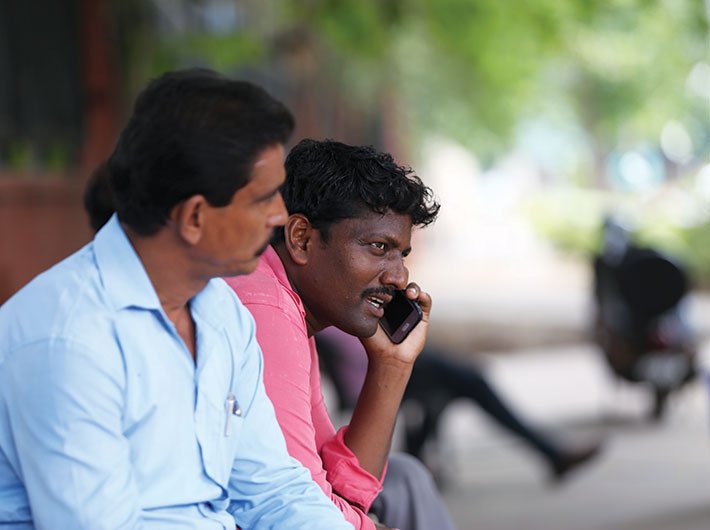Phone users are at their wits’ end to get their problems redressed. TRAI now plans to propose an independent body to tackle consumer complaints
Chandigarh-based Surinder Verma carries two SIM cards, of Vodafone and Airtel, but that hasn’t helped as he continues to face connectivity problems from both the networks. When Verma called the Airtel complaint centre, he was told that Airtel shares mobile towers with Idea in his area, and that he needs to speak to the Idea authorities. When he called Vodafone, he got the same response. Finally, when he approached Idea, the customer care authorities told him that there was a need to erect a new tower in his area. The present tower carried three networks, leading to congestion in connectivity.
“I know people from telecom companies since I am the member of the appellate authority and so it is easy for me to register my complaints and get it addressed,” says Verma who is a member of Punjab’s appellate authority for redressal of consumer complaints (of the telecom industry), representing the consumer body. But for other users it’s not easy, he admits. “In the process of registering their complaints, individuals are often neglected by these telecom companies.” Verma, who is also the head of a citizen awareness group, holds workshops in Chandigarh, Punjab and Haryana to collect complaints from people regarding their network, and take it to operators to get it addressed. He gets around 30 to 40 complaints in a month. He says many phone users do not wish to interact with operators for their problems as they have had bad experiences with them. “So where should they go?” He sought stricter penalty against the operators and regulatory intervention to tackle the matter.
TRAI, however, cannot intervene because the regulatory body has no power to look into individual cases. The body only deals in larger issues like spectrum prices and call drop menace. Despite the fact, TRAI continues to get services-related complaints from individual consumers. With no power, the authority directs those complaints to service providers itself. In the last one year, TRAI received 23,242 complaints.
Telecommunication is one of the biggest sectors that has continued to grow. It has around one billion subscribers. The growth has particularly been witnessed in rural areas where the market was largely unexplored.
According to TRAI, in March, growth in wireless (mobile) subscribers in rural areas was 1.31 percent against 0.21 percent in urban areas. On day-to-day basis, telecom-related complaints mostly involve unaccounted deduction of balance, over-charged bills, unnecessary messages for which customers are charged unknowingly and connectivity problems, among others. An unaccounted deduction of Rs 10 may sound trivial to the telecom industry, but it is a matter of concern for many consumers.
So what is the current system for a consumer to a file a complaint? As per the TRAI 2012 regulation, every service provider needs to set up a complaint centre to address the complaints of consumers. If a consumer is not satisfied with the way his/her case is being handled by the internal team, then he/she can approach the appellate authority, which has one member from a consumer body and the other from the telecom company. Still if the consumer remains unsatisfied with the verdict of the appellate authority he/she can approach the consumer court, the final destination.
A senior TRAI official says that going to the service provider with complaints is like “I am the judge and the jury”. Besides, who goes to consumer courts to resolve issues involving small amounts? There should be an alternative available in case a consumer is not satisfied with the redressal, the official adds.
Virag Gupta, a senior supreme court lawyer, says that it becomes difficult for consumers to prove their complaints in consumer courts due to “the technicality involved in the telecom matters”. Even judges at consumer courts, he adds, are not equipped to deal with telecom cases. “Hence, redressal becomes a tough proposition.”
To get over that, the TRAI will soon draft a consultation paper on setting up of an independent body that would address consumer complaints on an individual basis. “Formation of consultation papers is underway,” says the official. However, it is still not clear whether TRAI would handle the individual complaints or there will be a separate body to deal with it.
What if TRAI itself gets the mandate to deal with consumer complaints? There is no clear answer yet. “A regulator cannot act as a complaint redressal body. There are around 900 million users. If TRAI starts to take these many complains 365 days a year, then when will they work?” says a former TRAI chief. But some industry experts welcome TRAI’s plan to recommend setting up of an independent body for handling consumer complaints.
R Chandrashekhar, former telecom secretary and now president of Indian software industry body NASSCOM, feels a proper framework is “quite desirable”. He says, “We don’t have an effective system right now. Even the consumer court does not take up individual cases. More so, there is not enough capacity to deal with the increasing number of consumer complaints in the sector. So we need an autonomous body.”
Agrees Mahesh Uppal, a telecom expert and director of ComFirst India. He says, “The TRAI and the industry must prioritise consumer education.”
In fact, before setting up an ombudsman, Uppal believes, TRAI needs to “make markets work instead of penal action against telecom operators who do not treat customers fairly”. The latter sounds attractive, he feels, but it is difficult to enforce when subscriber numbers are close to a billion. It is best to focus on improving the quality of service, so number of complaints going to the ombudsman comes down. “If we continue to have a large scale of complaints, even having an independent body would not be effective,” he adds.
In 2004, the then TRAI chairman Pradip Baijal sent a recommendation letter to the department of telecommunications for setting up of an ombudsman. In his letter, Baijal had written that “there is a need to establish an internal mechanism like in other sectors, such as insurance and banking, to deal with individual consumer grievances”. “The prevailing structure is not adequate or fully responsive to deal with the consumer complaints in the telecom sector. TRAI has noted that establishment of an ombudsman could be a desirable development,” says his letter. However, the department did not respond positively to the recommendation. Today TRAI headed by RS Sharma is again trying to push the request forward. However, Baijal now has retreated from his earlier position and maintains that there is no need for an ombudsman in the sector.
“Having an ombudsman is not a viable option, if I look at it now. We already have consumer courts and consumer movement, which must be strengthened to have effective machinery for redressing consumer grievances. By empowering them we can make telecom operators accountable,” he says.
Lawyer Virag Gupta believes the same. “Instead of creating a new system, there is a need to empower existing mechanism,” he says.
According to another former TRAI chairman, the authority conducts billing audit every year in which it hires independent consultants to look at billing problems in all 23 licence service areas. The purpose is to check whether the operators are overcharging their consumers. If that is the situation, TRAI has powers to prosecute or penalise errant service provider. This is an indirect way of conducting regulation.
“We cannot have an ombudsman for minor issues that can be resolved at a lower level and issues that are generally ignored by consumers,” says another former TRAI chief.
In the midst of this debate on whether to have an independent body for consumer grievances or not, there are lakhs of consumers who want their complaints to be addressed. There is an obvious need to increase the capacity of consumer forums to deal with the growing number of complaints. Also, more transparency in services delivered by telecom operators is also required. Now it is to be seen how TRAI maintains the balance of interest between both the parties.
(The article appears in July 16-31, 2016 edition of Governance Now)



